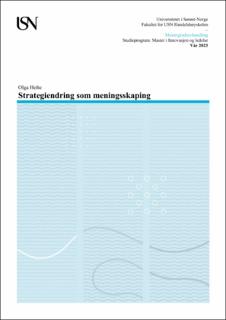| dc.contributor.advisor | Sørensen, Jarle Løwe | |
| dc.contributor.author | Holte, Olga | |
| dc.date.accessioned | 2023-08-30T16:41:35Z | |
| dc.date.available | 2023-08-30T16:41:35Z | |
| dc.date.issued | 2023 | |
| dc.identifier | no.usn:wiseflow:6825538:54930258 | |
| dc.identifier.uri | https://hdl.handle.net/11250/3086468 | |
| dc.description.abstract | Masteravhandlingen tar for seg de ansattes subjektive opplevelse av strategiendring, læring og nytte, og hvordan det bidrar til økt meningsskaping i en strategisk endringsprosess. Undersøkelser var foretatt i hele organisasjonen, da alle ansatte var berørt av endringen, og jobber kontinuerlig med strategi.
Grunnen til at dette tema var valgt til studien, er en viktighet av strategi i organisasjonens levedyktighet og fremtidige prestasjoner. Dynamiske kapabiliteter kan være nøkkelen til dette. Viktigheten av meningsgiving- og meningsskapingsprosesser i strategiske valgene – og suksessfull strategiimplementering – fremheves av flere forskere. Det argumenteres i denne oppgave at evne til meningsgiving-meningsskaping kan også ses på som dynamisk kapabilitet, slik som læringsevne er.
Det ble anvendt mixed methods forskningsdesign for å belyse oppgavens problemstilling. Det ble brukt tilpasset del av Collaboration, learning and usefullness (CLU) instrument, som ble tilpasset denne studiens temaer strategi, læring og nytte, og var sendt ut til alle organisasjonens ansatte. Deretter ble det gjennomført to fokusgrupper med 5 informanter i hver, hvor, i tillegg til temaer nevnt over, har det blitt snakket om opplevd meningsskaping.
Vi har undersøkt ansattes opplevelse av strategi, læring og nytte, og hvordan disse bidrar til økt meningsskaping. Hovedkonklusjonen er at det er signifikante sammenhenger mellom strategi, læring og nytte og meningsskaping. Det har imidlertid ikke vært mulig å avdekke om den positive opplevelse av læring og nytte bidrar til økt meningsskaping, eller omvendt.
Anbefalinger for videre forskning er å forsøke å avdekke årsakssammenhengen mellom læring og meningsskaping. Det bes også om å rette sitt blikk på iboende meningsskaping og dens rolle i organisasjonens læringsevne og endringsvilje.
Det anbefales til ledere å være oppmerksomme på hvordan tilslutningsfremmende tiltak, som for eksempel involvering av ansatte, kan påvirke organisasjonens prestasjoner.
Nøkkelord: strategiendring, organisasjonslæring, nytte, meningsskaping, innramming, dynamiske kapabiliteter | |
| dc.description.abstract | This paper addresses the employees' subjective experience of strategy change, learning and usefulness, and how this contributes to increased sensemaking in a strategic change process. Study was conducted throughout the organisation, as all employees were affected by the change, and are constantly applying strategy in their work.
The reason why the study on this particular topic was undertaken is the importance of strategy in the viability and future performance of the organisation. Dynamic capabilities could be the key to this. The importance of sensegiving and sensemaking processes in strategic choices – and successful strategy implementation – is highlighted by several researchers. It is argued in this thesis that the ability to sensemaking can also be seen as dynamic capability, as learning ability is.
Mixed methods were used to answer the research question in the thesis. The adapted part of Collaboration, Learning and Usefullness (CLU) instrument was used, and was adapted to the themes of strategy, learning and usefulness in this study, and was sent out to all the organisation's employees. Two focus groups were then conducted with 5 informants in each, where we discussed sensemaking in addition to strategy, learning and usefulness.
We have investigated employees' perceptions of strategy, learning and usefulness, and how these contribute to increased sensemaking. The main conclusion is that there are significant correlations between strategy, learning and usefulness and sensemaking. However, it has not been possible to determine whether the positive experience of learning and usefulness contributes to increased sensemaking, or vice versa.
Recommendations for further research are to try to uncover the causal link between learning and sensemaking. It is also requested to focus on immanent sensemaking and its role in the organisation's learning capacity and willingness to change.
It is recommended to managers to be aware of how endorsement promotions, such as employee involvement, can affect the performance of the organization.
Keywords: strategy change, organizational learning, utility/usefulness, sensemaking, framing, dynamic capabilities | |
| dc.language | nob | |
| dc.publisher | University of South-Eastern Norway | |
| dc.title | Strategiendring som meningsskaping | |
| dc.type | Master thesis | |
